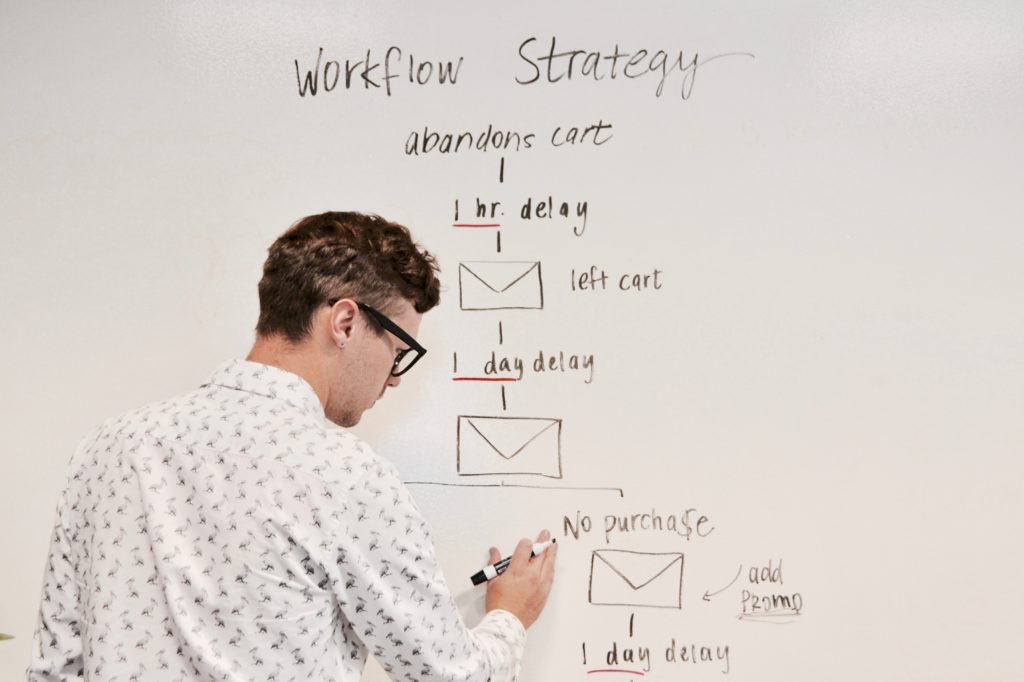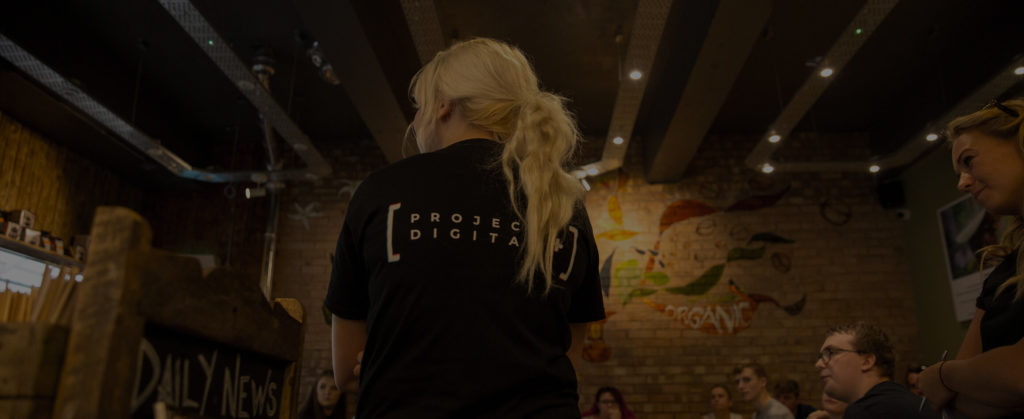University, Apprenticeship or Job?
Buckle up kids, this is a big’n!
Before you comment TLDR however… Please know that I spent ages writing this and that you’re more than welcome to skim read. I just want to make sure I give you as much information as possible so that you can make a well-informed decision.
The question probably ringing in your ears is;
“What’s my next step, should I go to university, take on an apprenticeship or just go straight into full-time work?”

Throughout this post, I hope to give you a good overview of the possibilities from a Digital Marketing career perspective.
Before we dive in however, let me just try and reduce your stress levels ever so slightly;
What’s important to remember is that whatever decision you end up making, doesn’t have to define you or your future ‘career’. Students (and everyone in fact) place so much pressure on themselves to get this decision right first time and subsequently end up forcing themselves down a route, that they end up not liking. If this happens to you don’t fret, you can always change ‘course’, ask for advice and go in a completely different direction altogether. There are numerous success stories of people who didn’t like their university course and dropped out, people who started in the workplace but wanted to get qualifications and many many more.
This decision is an important one, but not something that has to define you or your future.
*Another proviso; I’ll try to be as neutral as possible on this subject, but I am writing this with the Project Digital Apprenticeship course in mind (I’ve got to be honest with you!) 😉
Moving swiftly on…
Degree or not to degree?
The benefits and opportunities of attending university;

A perfect blend of learning and socialising
Going to university doesn’t just mean learning all day every day, in fact, it’s much more than that. Going to university will offer you the opportunity to explore so much of yourself. Whether you love sports, business, acting or evening juggling, you name it there will more than likely be an opportunity of you experiencing that thing you’ve always been fascinated by. University will introduce you to so many new people and often people you’ll be friends with for the rest of your life. As much as university is about learning and expanding your horizons it’s also about having fun, getting out into the world and letting your hair down slightly (and legally, now that you’ll be 18). You won’t find many more places, excuses or time to have fun, than at university.
Something that is important to most employers is not just your academic ability but yourself as a person. Businesses (especially those involved in marketing) don’t want to hire mindless drones, therefore they will want to know that you are someone that people will enjoy working with, someone that can manage a good work-life balance and someone who can bring ideas and inspiration from outside the office into their work.

Getting taught by exceedingly learned people
Regardless of which university you end up going to, you’ll be taught by people who are experts in their field of study. These people are likely to have written books, studies and several letters after their name (MS, Phd etc), all of which means that you’re getting access to their knowledge. This knowledge and the opportunity to listen and interact with these people is an exclusive thing, only yourself and your fellow students get that chance, this isn’t something that the public can just turn up to. The average university course is three years long, it’s vital that you get the most from your lecturers and teachers as possible whilst you’re there!
There is so much to be said for hands-on learning and many people can attest to being vastly successful from going straight into the workplace and experiencing the real world from the get-go, but what those people haven’t done and haven’t had the chance to do is focus purely on understanding the intricacies, facts, figures and statistics of their industry, nevermind the theories and intellects of world-renowned minds. You only really get this opportunity through university.
In regards to marketing and digital marketing, companies of course value real-world experience and that will come with time after attaining your degree. What you can show straight away after having left university however, is a deep understanding of a particular practice, tool or technique within marketing, something a company won’t currently have or have the ability to acquire elsewhere.

World-class facilities
Universities aren’t cheap, especially not since the fees increase, this means that universities will have pretty deep pockets. These deep pockets allow universities to spend money on the newest equipment, invest in high tech solutions and be at the forefront of education. Unlike government-funded schools with stripped back resources, old Windows XP computers, and cracks in the walls, universities have the latest of pretty much everything and you will get access to these incredible facilities.
Through the university, you get access to hundreds and thousands of books, resources and equipment, make sure to make notes, remember them and download all and everything you can into digestible and repeatable sentences and stages. Companies are desperate to have access to these facilities and equipment, so if you can give them even just a small insight into them you’ll be of value.

Valuable life experience
Coming straight out of school and into the real world can be a huge challenge. You might have to start paying bills, working out how tax works, doing your own washing and much more. University provides you with a ‘soft’ version of this. Yes, you’ll still have to wash your own clothes, handle your own money and essentially look after yourself but without all the other red tape to worry about just yet. When you go to university you have your rent and accommodation ‘sorted out’ for the most part (at least for the first year), you get discounts galore and you get a maintenance loan, meaning that you wouldn’t necessarily have to get part-time work to keep you going. In fact, at universities such as Oxford, Cambridge, Durham and a few others it’s frowned upon and even disallowed for students to get part-time work as this might detract from studies.
Basically, university lets you have some important life experience without the huge other burdens that come with it once you leave. You’re effectively in a protective bubble whilst you study, so unlike the other two options here, you can experience a lot more in a short period of time.
P.S. If you can get some industry experience whilst you’re there as well it wouldn’t go amiss.

Great connections
As touched on before, university isn’t all about studying and that’s also not where you’ll get the most value either. The value you’ll get from your time at university will come out of the whole collection of prospects put in front of you. Whilst you’re there you be experiencing, learning and meeting new and interesting people. Some of these people will become influential characters in your life. Some will be your best teachers, your best friends, and invaluable contacts later on in life. The networking opportunities that university presents is pretty unparalleled to any other networking ‘event’ you’ll ever go to. Your lecturers, mentors and classmates will go on to become important and successful people, people you’ll likely want to know in the future.
A business won’t just want access to your skills and knowledge, they’d also love to tap into your network, so make sure to make that network as valuable as possible!

Extracurricular activities to get involved in
American Football, Gin Tasting, Frisby Golf, TiddlyWinks, Game of Thrones… You name it there’s probably a university society for it! (And if there’s not, you can set one up).
University offers you the chance to get involved in weird and wonderful, mainstream and niche, sports and sitting still activities 10 times over. Whatever your heart fancies you can jump on. This is like a once in a lifetime opportunity. Even if you’re taking one of the more heavily ‘houred’ courses (i.e. you’re actually in university for more than 20 hours a week) that means you still have hundreds of spare hours to do whatever the hell you like with!
These societies, classes and extracurricular activities may just seem like harmless and possibly pointless debauchery, but in actuality, you’re fueling your imagination and gaining extra insight into the world and this is all valuable stuff for future career prospects. Bring that otherworldly knowledge of Harry Potter into the workplace and shine at an interview!

A degree at the end of it all
We’ve skirted around this one a bit up until now, but don’t forget, alongside all of this other great stuff you get from university, you also get to go up on that stage, in cap and gown and collect your diploma. A degree is still a massively powerful tool to open doors and gain employment. Proof of a commitment of around 3 years, dedicated study, high-level knowledge of a subject and hopefully a well rounded educational experience will go a long way to helping your career potential.
A degree is something you keep for the entirety of your life, it’s not like other training where you have to update it every year or so. A degree stays with you across your career, it highlights to employers your interests, abilities and knowledge.
A degree is the symbol of the pursuit of higher knowledge and a desire to know more and to educate yourself, it’s a sign that you’re a person worth taking seriously. A lot of people without degrees often regret not having done one as it can sometimes restrict career progression and can even end up having to do one over a series of years in their spare time.
Limitations and risks of going to university;

Deciding on the right course
Unlike university in America where students pick a wide variety of subjects and only choose their ‘major’ in their final year, we here in the UK have to decide what course we’d like to do from the start. Because of this, it can be rather easy to end up on a course you’re not too keen on or find out isn’t quite right for you. There are rather high levels of drop out from university (around 5-6%) and this is largely due to wrong courses, poor support for the students who need it and changes of heart.
Before the days of the internet when the only way to get knowledge was to read a book or learn from an experienced teacher, university was far more important. These days you can learn pretty much anything online, sure there is sometimes a cost, but nothing that’s anyway near that of university fees. University courses used to be very specific and narrow with subjects such as; Law, Accountancy, Medicine etc, now, however, as the world has become more connected and interconnected we need more expansive knowledge that covers a breadth of subjects and issues university is all about giving you the chance to experience those things.
All of the above can now arguably be learned on the job and perhaps within the setting of an apprenticeship (and without getting yourself into thousands of pounds of debt).

Cost
News headlines, campaigns and protests across the country jeered in anger about the rise in the cost of university. They not only increased but effectively tripled in price! At a rough price of £9,000 per year, the average three-year course will set you back £27,000 (minimum). Add to that the cost of living, the cost of buying books and possible supplies and you could end up in over £40,000 worth of debt, all for a little piece of paper.
Of course, that’s a slight exaggeration and this piece of paper isn’t exactly ‘worthless’, but there are plenty of people who have been perfectly successful without it, not to mention, not all employers look for degrees when hiring. Whilst you’re spending 3 years and thousands of pounds learning something, your friends who decided to go straight into work or take an apprenticeship are earning a living. That means that after your three years are up, your friends will have three years more work experience than you and likely have some savings to boot!
The cost of university definitely shouldn’t deter you and shouldn’t be your only ‘excuse’ not to go, but it’s certainly worth factoring in. Remember, you don’t have to pay the cost upfront and the interest rates are incredibly low and spread out over tens of years, meaning that you’ll barely notice it when it does start to come out.

Big leap (to move away from home or not)
For some, the idea of moving away from home is an unfathomably exciting prospect, whilst for others, it can be incredibly daunting and scary. Your parents/ guardians have been your safety net for at least 18 years now so to have that effectively ‘ripped’ away can be something that will affect your decision to go to university. You’ll have to start caring for yourself, cleaning up, monitoring your finances, keeping your own calendar and much more. All of this is a huge leap of faith, there’s no way out of this once you jump in the deep end (other than dropping out) so it will have to be your best ‘guess’ as to whether you think you’re up to the challenge.
*You don’t have to go straight to university once you’ve gotten your grades, some people choose to take a year or two out before going. These years can give you a chance to make up your mind, save some money, gain some experience elsewhere and gain some other important life experience.

Is academia right for you?
Years of your life up until now have been in education. You may have taken to it naturally. Things such as revision, exams and coursework might be things you excel in or, you might have struggled slightly and gone into school every day begrudgingly. If this is the case, university may not be right for you.
Sure, when you go to university you get to choose what you study (essentially) but you still have to put in a lot of time to learn, go to lecturers in the early hours and even worse self motivate yourself to put the work in!
There will more than likely be exams and almost certainly some coursework, especially if you’re on a course that requires a dissertation.
If all of the above has made you squirm with fear and anxiety, university may not be the best choice.
Don’t get confused, regardless of what direction you’re going to go in you’re going to have to put the work in, but if you’re not one for ‘learning from books’ or don’t like being lectured to, have a good think about whether university is right for you or not.

No guarantee of a job or ‘success’ afterward
As much hype as there is around university degrees and how valuable they are for your future careers you have to take it with a pinch of salt. There are of course some limiting features such as the university you end up going to (obviously there are rankling tables for this), then there’s the grade you come out with and you also want to make sure that you’re a well-rounded individual as well.
With all of that said, let’s say you get into one of the elite redbrick universities, come out with a 1:1 or a 2:1, have been involved in several societies and made sure that you’re an immensely well-rounded individual, you’re still not guaranteed employment. That means you will have spent 3 or more years dedicated to your advancement and still might end up living at home until you secure a job. The job market and the real world is a cruel place, it will take a look of applications, a bit of ‘luck’ (the right place at the right time) and even more dedication.
When you compare this to the other two options here you might have a rethink. With an apprenticeship, you’re working and learning (and being paid) and if you go straight into work, whilst you might start at the bottom, within the 3 years that your friends are at university you can climb that ladder and could very well be ahead of them before they even start looking for work.
In summary;
University is a great option so long as you’re willing to accept the debt you’re going to be in (and remember it’s a low-interest rate and you don’t have to pay until you’re earning), you like or can at the very least put up with extra years of education and academia and you’re willing to put in the work during and afterward.
It could well make getting advancements in your career easier in the long run but it can certainly be a struggle in the initial few years.
If you’re skeptical about any of the above, an apprenticeship or going straight into the world of work might be worth considering.
To come aboard the Apprenticeship or not…
Benefits and opportunities of an apprenticeship;
Get your foot on the job ladder
Unlike going to university where you essentially stave off from starting work for 3 years, with an apprenticeship one of the fundamental parts is having employment and a job in an industry you hope to have a career in. This means that from day one of your apprenticeships you are in gainful employment, you’re being paid, you’ve got managers, colleagues and are getting your funding and qualification paid for.
Not only this, unlike most university degrees which are deliberately non-specific (such as Engish Language, Business Management or Geography) you are learning on the job and specifically for that role you are in. So if you’re a plumbing apprentice you’re learning the skills you need for that role, if you’re an accountancy apprentice you’re learning the key skills for that role and if you’re a Digital marketing apprentice you’re learning about the world of Google, Facebook, Instagram and all the techniques that go alongside those, which will suit your role.
You’re learning all of this whilst getting your foot on the career ladder, something your university friends won’t be doing for at least three years yet!
P.S. Don’t forget, once you’ve completed your apprenticeship and have the skill and experience you could probably move up in the company or even move elsewhere and stretch your horizons even further!

Learn and earn
As touched on in the above section, with an apprenticeship you’re actively being paid to learn. You’re not just having your education covered, you’re actually making an active ‘profit’ whilst you’re still studying. If you were to go to university you would come out with negative money (i.e. debt) and that debt would be there for a long time, but if you were to do an apprenticeship, not only would your studying be completed within a space of 18 months but you’d also come out from it with money in the bank!
A lot of employers take on apprentices with the idea in mind being to keep them on after their apprenticeship is over, so this means your wage would go up and you would be in with a chance of getting an even bigger role, more responsibility and potentially even more progression opportunities.
It’s a win, win situation.

You still get a lot of the perks of being a student, without the debt
Moving on from ‘learn and earn’, some people might be annoyed that their friends who go to university get loans, grants and loads of discounts. Well, though you may not get the loans and grants (debt) you can still get access to the discounts! As long as you’re a student registered to an acknowledged education provider you can still get all the same discounts as your university going friends. NUS, Unidays, Student Beans… You name it, you get it.

Learn from experts (both on the job and in college)
With both apprenticeships and going straight into work, you’ll be getting information, learnings and experience from people who are experts in their field. You’ll be watching and understand how things work, you’ll be speaking with people from around the business and the industry and you’ll be taught by people who apply their knowledge day in and day out.
Some colleges and education providers run similar to universities and have academics lead their courses. This means that lectures are about the theory and thinking behind subjects, but they lack the implementable takeaways that people and businesses really want.
It’s all well and good understanding ‘what makes people tick’ and ‘trickle-down economics’ but what you really want to know is how to make people click that button on your website and by the stuff from your Facebook ads. At Project Digital you get the best of both worlds. We teach you the theory, the practical and through your apprenticeship, you get to physically apply your new-found knowledge.

Digital Marketing is a young person’s game (get involved fast!)
If you’re considering an apprenticeship, a university course or getting your first job it likely means that you’re in the 18 – 25-year-old bracket and this would put you nicely into the millennial/ Gen Z pocket. Unlike the generations before them, Millennials and GenZ don’t know a world without mobile phones, social media and Netflix, therefore this puts you at a massive advantage in terms of understanding and working in the world of Digital Marketing. Effectively, you are digital natives. You were born into it, it makes sense to you and it is almost like second nature.
With this in mind, there has never been a better time to take an apprenticeship in digital marketing. You can go into a business, offer your inside knowledge, learn the theory and the details behind it and apply it and become a superstar.
The more age advanced (older) people in your company will be overwhelmed and bamboozled by your knowledge and abilities and should, therefore, recognise the value you bring to their organisation, of course, it helps if you can explain it back to them as well!

Your value as an employee is increased as they’re actively paying for your training!
Normal jobs (graduate, entry-level or standard jobs) don’t usually involve 18 months of training and the employer having to pay out for that training. Apprenticeships, however, do just that. This means that your employer has committed their time, resources and money into your role. As your knowledge increases, your value increases and considering all that your employer is and has pumped into your role it would be fair to assume that they value you quite highly indeed!
Limitations and risks of an apprenticeship;

Not as a well ‘revered’ as a university degree
A level 3 apprenticeship in Digital Marketing may not be looked upon by employers as valuable or prestigious as a degree from a university. Simply put, you won’t have spent as much time learning on an apprenticeship as you would at university, nor do you come out with a degree from a university to show off.
Due to this, graduate jobs may not be something you can apply for in the future as they will typically look for people with a degree, regardless of what that degree is.
It’s a silly system and it’s due for an update, but that is the state of affairs as it is now, it’s ‘good’ to be aware of it.
There are of course ways around this such as following your level 3 you could go on to do a degree-level apprenticeship or even go onto univesity afterward as well. The level 3 lays an excellent foundation.
![]()
Having to balance studying and working at the same time
An apprenticeship in the UK is designed to be 80% time spent ‘on the job’ and the other 20% off the job learning. The off the job learning can be done in a classroom, online, attending events and much more.
Regardless of how you spend your time learning off of the job however, it will mean that you will have less time than your full-time colleagues to complete work and this might cause some stress.
Likewise, whilst you may not get homework week in week out from your off the job learning, you may at times be assigned portfolio or coursework to complete.
With all of this in mind if you struggle to prioritise, schedule and keep your calendar an apprenticeship might be a difficult undertaking.
Of course, the whole point of an apprenticeship is to learn, not just workplace skills and capabilities but ‘life skills’ as well, so it might pose as a good opportunity to push yourself and learn these competencies.

Low wages
Apprenticeship wages aren’t known to be particularly generous and there’s no hiding or getting away from this. At their lowest, wages start at £4.15 and increase in line with your age. Unlike university, you won’t get a maintenance grant so moving away from home may prove difficult and you almost certainly won’t be earning as much as your full-time friends and colleagues.
Apprenticeship roles aren’t designed to big earners but are designed to be a blend of studying and getting into work and they do that very well.
You’ll want to find a role, industry and an employer you can see a future with, the same as with any job. We’re very picky with who we have as an employer on our course, we want to make sure that the fit is right for everyone involved.
*If you know of a company you’d like to work for but they don’t currently have a Digital Apprentice role but you think they might be interested tell them to get in touch and we can have a chat with them!

‘Bottom’ of the company and a long way up to the top
Some apprentices report that they feel as though they are the bottom of the barrel in their company, struggle to get their voice heard and are just there as a cheap pair of hands. As stated above, we chose our employers very carefully so we aim to minimise this as much as possible.
Of course, we can’t eliminate all doubts and there may come times where you do feel as though you’re on the lowest rung within the company. Just keep in mind that whereas others might be ‘higher’ up in the company, you’re still learning and having that education sponsored by your employer which means they see value and potential in you and whilst you may currently be low down, your opportunities will only grow as time goes on.
If you’re not willing to start and remain at the ‘bottom’ for the length of your apprenticeship, this might not be the right direction for you.

You’ll still have to pass tests and do coursework
This might not be the same for every course, but on the level 3 Digital Marketing course we run there is a portfolio you’ll have to develop, a couple of tests/ exams to pass and some coursework to complete before the end of the course. Don’t worry, we help you through it and make sure it’s as simple as possible.
Unlike other courses and education facilities, we blend the learning and live projects into the subjects for the exams and help you build your portfolio as the weeks pass, so almost without realising you’ll have soaked up all that new knowledge and created a killer portfolio.
Having said all of that, if you’re not one for writing, collating documents and evidence of work you might want to avoid this course and digital marketing as a whole! ;P
In summary;
As I stated in my post about how we support our apprentices, I wish I’d known more about apprenticeships and had been encouraged to consider the idea more, but alas, my school was all about university and higher education so my fate was essentially sealed. You however, have the chance to explore and consider all of the options, so I’d really advise doing that!
If you’re interested in getting into the real world straight away, getting that first paycheque but still want to learn and continue educating yourself, an apprenticeship might be the perfect fit for you.
It’s hard work, it can be long hours and you might end up wanting to do even more education afterward but it’s a very good option.
*Feel free to read some testimonials here…
Full-timing it…
Benefits and opportunities from going full time straight away;

Getting paid #Ca$hMoney
Obviously one of, if not THE biggest advantages to getting straight into work is the money. Who doesn’t love a big paycheque after all? Need I say more?…
Just to cover all the bases I’ll carry on regardless.
If you get into the world of work at 16, 17 or 18 years old you’re starting nice and early. This means that by the time your friends who have gone to university or done an apprenticeship have finished you’ll be miles ahead in terms of experience, possibly hierarchy level and even pay.
You could be well on your way to saving up to buy a house, get a nice car and treating yourself whenever you feel like it.
Just be warned, you might be the one always getting the drinks in, as you’ll be the one with the most disposable cash!

Full focus on the ‘job’ at hand
When you go into full-time work you’ll be spending all day, every day (other than weekends) focused on the work. There won’t be any distractions, nothing else to think about or concern yourself with and that means you can be super effective and efficient.
Sure, there might be some induction training, health and safety ‘nonsense’ but following that it’s all hands on deck and time to get cracking.
When you’ve not got anything to distract you or take up your time you can get some really important and big work done, nice and easy. If you’re dedicated, consistent and enthusiastic with your full-time employment it usually gets noticed and that’s a great thing.
It’s an excellent feeling to be all consumed around doing a job well done and getting a full five days of the week to concentrate on it knowing that you’re free of any extra education.
Climb the job ladder quicker
This is similar to the above points, but I thought it meaningful enough to give it its own specific focus.
Whilst following a degree or during an apprenticeship, you might start up slightly higher in an organisation, when you work full-time in a company, you put all your time and energy into the role and get your teeth stuck in, not too mention you get to lay a good foundation quicker and make allies within the company sooner. All of this results in becoming a well-known commodity and asset in the company and this gives you incredible opportunities, far beyond your friends who will only get this chance once they’ve finished their studying.
Companies often rather than hiring an outsider will want to promote within and if you’ve made a good start, shown willingness, determination and ability you give yourself a good shot of being chosen for that next role quickly.
Limitations and risks of going full time straight away;

Low entry-level jobs
Similar to apprenticeships, you could well have to start at the lowest rung in the company, such is the way of the world!
Companies will be reluctant to hire inexperienced individuals for any higher up jobs and this can be frustrating, especially if you’ve previously done well in school, have had work experience elsewhere and that you know in yourself that you’re capable of so much more.
It can be a really hard slog at the bottom and you can sometimes be made to feel like a bit of a dogsbody, doing small and menial tasks, the idea being to eventually move up in the world of course, but everyone has to start somewhere!
Can be restrictive without a qualification
Putting it bluntly, it can be quite difficult at times to get a promotion, salary increase or more responsibility without the right or at least some form of qualification. This is becoming less of an issue these days with more focus in the workplace being placed on experience and capability as opposed to a piece of paper but it is still something you might come up against.
You might be with a company for several years, get promotion after promotion and think that you’re making real headway but at some point, you may hit a ceiling you can’t push past without the requisite qualification/ degree/ apprenticeship and this can be a difficult reality to take.
This is something that is becoming a thing of the past ever so surely, but it’s good to be aware of.

Having to go straight from school into a job (more 9-5)
With both university and an apprenticeship, you get some breaks from work (whether because of gaps in between lecturers or through off the job learning).
When you go straight into work however, you’ll likely have to keep up the 9-5 hours!
You’ll have to get up early, get into work on time, work hard for hours on end (except for lunch and a small break) and make sure you hit your targets whatever they are.
You could, of course, take a bit of a break before diving into the world of work, if you can afford it go traveling for a bit and see the world but always in the knowledge that as soon as you return it’s straight back onto the conveyor belt of life!
*Sorry for painting such a bleak picture, it’s just a good exercise sometimes to think about the ‘worst case’ scenario). Fortunately, in the digital marketing industry, there tends to be a more relaxed vibe and you won’t feel as much pressure as you would in some industries.
Tax & Bills
When you start working full-time and earning a full-time wage you open yourself up to being taxed and probably start taking on more bills whether that be rent, car payments, Netflix and more, it all adds up.
It’s as simple as that, the more you earn, the more you get taxed and usually the more you want to spend as well. The more you earn the more people expect you to pay for things so keep an eye out for that.
Tax and bills really aren’t a huge deal and they’re not exactly a surprise, but they’re definitely something to consider when you’re looking at going into full-time work.
If you don’t like your job, it could be tough to find another one
By jumping straight into the world of work you could effectively be taking a leap of faith. Either you’ve found a job or industry you’re interested in and are therefore giving it a go or you are simply finding the first job available that doesn’t sound awful to you. Either way, you’re diving in headfirst effectively. Whilst this could be a good strategy and you could end up in a role and business you like, equally you could end up doing something that isn’t particularly fulfilling and in a business that you don’t enjoy operating in.
If you were to discover that actually you don’t like that industry, that role and that business, you may have to pick yourself and effectively start over again in a new role and industry and you could end up rinse and repeating this until you get it right.
What will make this more difficult is not having a safety net of a qualification. When you have a qualification, be that a degree or an apprenticeship you can showcase your dedication to higher learning and ability to pick things up and this will stay with you forever.
As for digital marketing, there isn’t anything that strictly says you have to have a qualification, but due to high demand for jobs it can be rather competitive and anything you can do to get your foot in the door would be advantageous.
In summary;
As with the other two options outlined in this post, there are plenty of upsides and ‘risks’ with going straight into full-time work. My advice would be to be cautious about doing this as there’s no real reason you should have to go straight into full-time work as you can do that at any point, even if you were to try university or an apprenticeship first.
Going straight into work could certainly help pay bills and build up your savings quicker than the other two options, but really consider your decision. Of course, you could also start working and build up some savings and then go onto do an apprenticeship or degree course in something you’re really interested in and build a career but a word to this wise, it might sound like a good and easy thing to do, but once you’re in a job it can feel quite difficult to break free of it!
The summary of all summaries;

We’ve done it, we’ve come to the end of this masterpiece of writing and now I’ve got to sum up all that we’ve learned along the way.
Firstly, remember that regardless of your decision it doesn’t have to dictate your future and that whilst it’s an important and big decision it’s not one worth ruining your life over. Whether you’re in your last year of school, currently on a gap year or if you’re working, make sure to enjoy that as much as possible and take your time thinking clearly about your next move.
The uni summary
If university is one of the options you’re currently looking at I’d be very encouraging towards that. At university, you get access to incredible facilities, get involved in some awesome extra-curriculum activities, make some amazing life long connections and friends and of course, you’ll end up with a degree from it at the end of that day as well, which will stay with you and be on your CV, most likely, for the rest of your life.
Things to look out for and be aware of though, of course, is the cost of studying, especially in comparison to the other two options laid out in this post. Similarly, university can be extremely tough and involve a lot of studying, writing and hard work and after all of that, there’s still no guarantee in terms of a job and future success. Finally, you won’t get to join and meet us at Project Digital (at least for a few years anyway 😜). Regardless, try not to let those put you off, university is a great route to take and an option you shouldn’t shoot down too quickly.
The apprenticeship summary
An apprenticeship is an excellent thing whether it’s something you do before, after or instead of going to university. As covered above an apprenticeship will give you an instant foot up on the job ladder, something which can be incredibly difficult to do otherwise. You can do an apprenticeship and avoid getting yourself into debt and you even get paid and finally, especially with Project Digital, you get to learn from industry experts, both in work and in class!
Keep your eyes peeled though, apprenticeship roles in companies are typically not very well paid, you can often feel as though you’re the bottom of the bottom in a company and don’t forget all that pesky coursework and exams you’ll end up having to do at the end of it! Apprenticeships are an excellent concept and a wonderful opportunity when delivered right and when you find the right job and company. So, keep your wits about you, do your homework and speak to as many different people involved as possible. We’re always here to chat and talk you through your decisions, so don’t hesitate to get in touch.
Feel free to have a look at our current vacancies and keep an out for any future ones as well.
The full-time summary
Last but by no means least, full-time work could well be the right choice for you. The biggest positive with going straight into full-time work is, of course, the #CashMoney! Imagine, even on minimum wage you’ll take home around £1,000 a month, that’ll cover one heck of a spending binge on Asos! So if money is a big driver for you and something that you want to get on top of straight away then have at it!
Just be prepared to start at the bottom and gradually work your way up and don’t forget about those pesky bills and tax you’ll end up having to pay!
And there we go, all of the summaries done and all the information you could ever hope for, what a thrill it’s been!
If at the end of all of this, you’ve decided that an apprenticeship sounds up your street and specifically one in the world of digital marketing make sure to get in touch with us here!
We look forward to hearing from you and helping you with your digital marketing future!

At Project Digital we have students from all different backgrounds, educational routes and interests, therefore, it doesn’t matter if you don’t come to us straight away, in fact, I’d go so far as to say that we’d encourage you to go and explore more opportunities and experiences so that once you do decide to come study with us you’re clear in your mind and incredibly enthusiastic about the world of digital!
If you’d like any more information you can find it here, if you’d like to get in touch please do so by clicking here.
Thank you so much for reading, I hope it was informative and of use, have a wonderful day!
Your hopeful future tutor,
LSJ 😉




